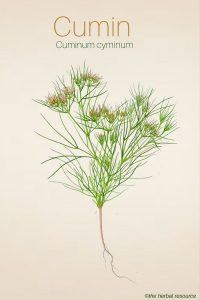Cumin is a crop that was in use in the Mediterranean and the Middle East already in antiquity. The herb is mentioned in the Bible and also on Sumerian clay tablets.
In the Egyptian Ebers Papyrus (written around 1550 BC) cumin is described as an ingredient in several of the Egyptian medicines, and the seeds have been found inside some of the Egyptian pyramids.
Among Europe’s oldest cultures, it was highly valued as a spice and was e.g used as pepper substitute in ancient Rome.
In ancient Greece, cumin symbolized extreme greed for wealth or material gain and it was said that avaricious people certainly ate cumin.
The herb has been cultivated in Spain since the 11th century. Cumin was introduced by Spanish explorers to South America where it soon became very popular and has gradually become an important ingredient in Mexican cuisine.
Cumin had a prominent role in the past as a medicinal herb and was used against a wide variety of ailments, such as jaundice, fever, lung diseases, nosebleeds, and menstrual pains. In the Middle Ages cumin was still greatly sought after in many European countries and it was discussed in Nordic medical books from the 13th and 14th century.
The herb popularity as an herbal medicine has dwindled since then, but it still plays a vital role in Egyptian herbal medicine.
Modern Day Medicinal Use of Cumin
The plant family Apiaceae contains many important medicinal and spice plants, and cumin has in the same way as its close relatives caraway (Carum carvi) and anise (Pimpinella anisum) anticonvulsant properties, and when used in tea form it seems to have positive effect on the digestive system and it is often used as a remedy for bloating accompanied with colic or diarrhea.
Cumin stimulates saliva production, secretion of digestive fluids and excretion of bile, and additionally, it provides increased movement of the intestines, which generally improves digestion.
Cumin may also be useful as an herbal remedy for irregular or infrequent periods when not related to an underlying disease.
The seeds are sometimes used in tea form to increase the production of breast milk in lactating women, the same way as fennel seeds (Foeniculum vulgare).
In some countries the seeds are thought to be helpful in relieving menstrual cramps and as an abortifacient agent.
The essential oil of cumin is rich in vitamins A and C, making it a powerful antioxidant and thus a potential cancer-fighting herb. Studies on rats showed that cumin inhibited the formation of cancer tumors induced by a carcinogen. Studies also have indicated that an extract of cumin may have an estrogen-like effect.
In another study where cumin was administered to healthy rats, it increased their glucose tolerance which indicates that it may have an anti-diabetic effect. The possibility that cumin can help to control or prevent diabetes in humans is still unknown and further and bigger studies are needed to investigate the herb’s usefulness in that regard.
Externally, the essential oil of cumin mixed with a base oil can be used as a treatment for cellulitis.
In Indian herbal medicine cumin is used to treat insomnia, colds and fever, and mixed together with onion juice it is applied in paste form on scorpion stings as a relief.

Leave a Reply